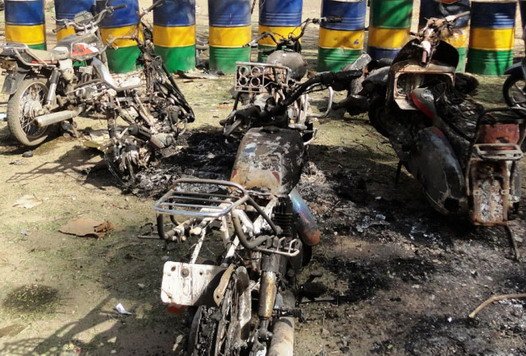
In 2019, leaders of West African countries adopted the ambitious 2020-2024 Priority Action Plan to Eradicate Terrorism in the Economic Community of West African States (ECOWAS) Region. Four years on, the situation has not improved and violent extremists still threaten security and stability. As the plan’s expiry approaches, questions about its implementation and impact are pertinent.
The plan has eight interlocking priorities, including coordinating counter-terrorism initiatives, information and intelligence sharing, and inter-community dialogues. Its adoption reflected deep concerns among ECOWAS leaders about the terrorist threat and a sense of urgency to respond. However, implementation has been limited to several training and sensitisation activities.
Officials familiar with the plan told the Institute for Security Studies (ISS) that several problems emerged from the outset. Key among them were resource constraints, evidenced by the failure to raise the budgeted US$2.3 billion. Member states differed on whether to contribute to a common ECOWAS pot or allocate funds to their own national efforts, the officials said.
The West African Economic and Monetary Union opted to allocate its US$100 million contribution to Burkina Faso, Mali and Niger. Nigeria and Ghana also prioritised national security initiatives. Of Nigeria’s US$100 million, 80% was to be allocated to combatting Boko Haram in the north east of the country, while the remainder was to go to ECOWAS.
Officials noted that Ghana allocated only US$5 million of the US$50 million it pledged to ECOWAS in 2020. The remainder was for its own security efforts in the northern regions bordering Burkina Faso. It is unclear how much of the pledged amounts were disbursed.
Funding shortages were compounded by other member states’ failure to contribute, and ECOWAS’ long-standing financial crisis. Payment of the regional bloc’s community levy – a 0.5% tariff on imports from non-ECOWAS member states, which constitute 70% to 90% of the organisation’s budget – has not been forthcoming. This is something ECOWAS’ Parliament complained about in 2021.
Countries’ allocation of counter-terrorism funds to national rather than ECOWAS initiatives reflects a deeper issue – a lack of commitment to a regional, collective approach to tackling violent extremism. This is because, despite its transnational nature, counter-terrorism is primarily perceived as a matter of national security and sovereignty.
Member states experiencing terrorism, or the threat of it, are apparently unwilling to defer leadership and coordination to ECOWAS. Instead, they choose to address vulnerabilities by themselves or through ad hoc sub-regional efforts (such as the Multinational Joint Task Force, Group of Five for the Sahel Joint Force, and Accra Initiative) and bilateral mechanisms.
Also, member states that were only beginning to experience the spillover effects of terrorism largely deemed the threat as external, and felt it didn’t warrant significant regional financial commitments.
Beyond the lack of money and a preference for national and sub-regional action, were the fallouts from ECOWAS’ response to coups in Burkina Faso, Mali and Niger – three member states most affected by terrorism. The imposition of ECOWAS sanctions and the regional bloc’s threat of military intervention in Niger seriously divided the organisation.
It led to the three states announcing their withdrawal from the bloc, and their formation of the Alliance of Sahel States (AES). Officials told ISS that the AES – which had criticised ECOWAS for its lack of counter-terrorism support – became suspicious when the organisation decided to set up a regional force to counter military coups.
Although the force’s aims were initially to combat terrorism, the AES states viewed it as targeting them and refused to contribute to it. Yet ECOWAS leaders made it the centrepiece of counter-terrorism efforts and have sought to mobilise funding for it.
This situation has weakened cooperation against violent extremism, impacting specifically on information and intelligence sharing and even the conduct of joint operations and other activities. The ECOWAS Special Envoy for Counterterrorism, Ambassador Baba Kamara, has been unable to travel to the AES states mainly because they refuse to receive him.
In the end, ECOWAS failed to eradicate violent extremism due to these financial and political blockages. While they appear insurmountable in the short term, the regional bloc has an opportunity to revive its counter-terrorism efforts even if the AES states withdraw.
This will require institutional reforms that improve the organisation’s financial standing or guarantee funding for tackling the terrorist threat. Suspicions about ECOWAS’ motives in handling political and security challenges must also be dealt with, and regional cooperation encouraged.
These are however medium-term measures. In short term, ECOWAS should consider revising the plan to focus on support for affected member states that includes non-military approaches, like those implemented in the Lake Chad Basin.
This could involve supporting gender-sensitive and community-driven disarmament, demobilisation and reintegration processes that could incentivise and sustain defections from terror groups. Lessons from these processes in the Lake Chad Basin offer a starting point.
ECOWAS could then focus on supporting countries, including the AES, to address developmental deficits that are among the structural drivers of terrorism.
Written by Sampson Kwarkye, Project Manager, Littoral West African States, ISS Regional Office for West Africa and the Sahel.
Republished with permission from ISS Africa. The original article can be found here.









